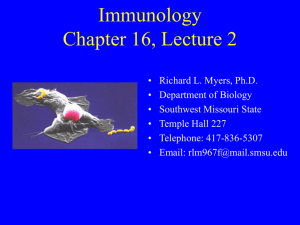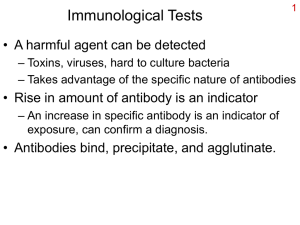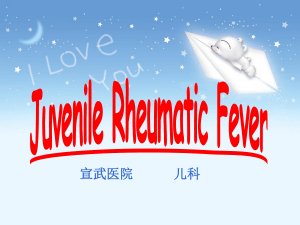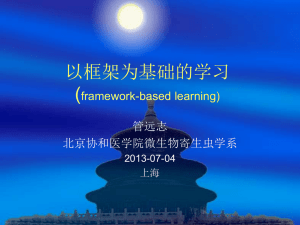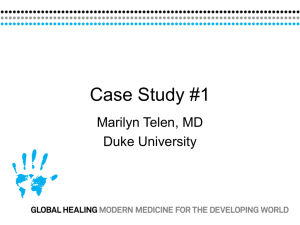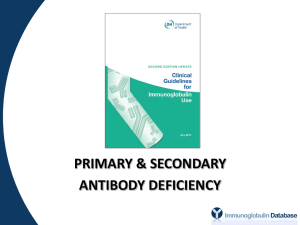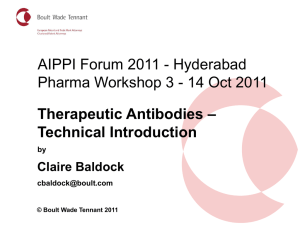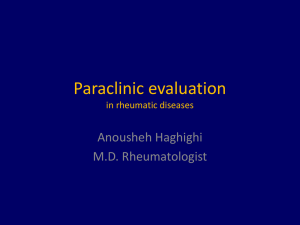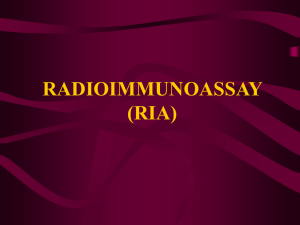Antibody Patents in India
advertisement
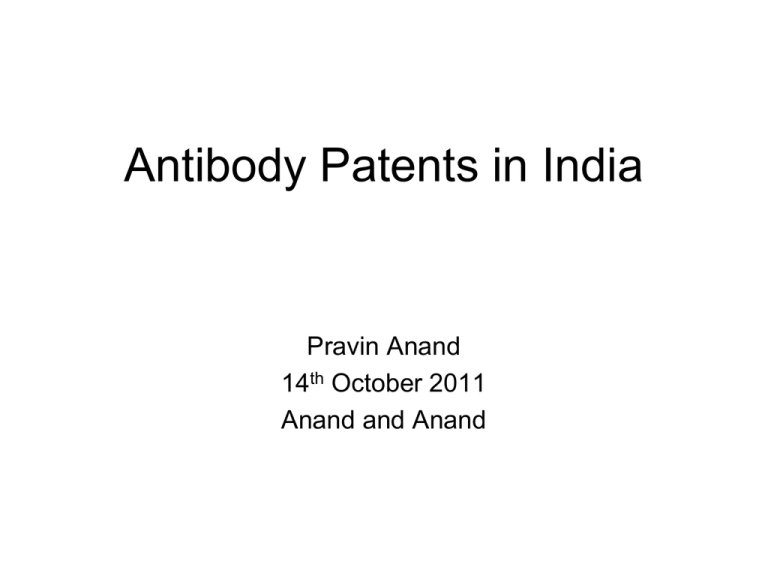
Antibody Patents in India Pravin Anand 14th October 2011 Anand and Anand Introduction • • • • • Size of Market Number of patents granted Types of claims allowed Patentability issues Biological deposits Size of Market • During 2010-11, Biotech sector grew at 21.5% • Total Size: Rs 17400 Crores Size of Market Patents granted • Antibody related inventions, granted patents going up (over 230 patents in 5 years) – 3.92% in 2005-6 (as percent of total Biotech patents granted) to – 10.46% in 2009-10 Comparison- Patents Granted ( Total Vs. Biotechnology ) 18000 16061 16000 15316 14000 12000 10000 Total patents Granted Biotechnology -Patent granted 8000 7539 6168 6000 4000 4320 2000 1157 0 51 2005-2006 89 2006-2007 449 341 2007-2008 2008-2009 2009-2010 Comparison - Patents Granted ( Biotechnology Vs. Antibody ) 1400 1200 1157 1000 800 Biotechnology -Patent granted Antibody related Inventions granted 600 449 400 341 200 89 0 51 2 2005-2006 7 2006-2007 86 47 27 2007-2008 2008-2009 2009-2010 Types of claims granted • Functionality based eg Antibody that binds to and neutralizes a specific Antigen • Structure based eg Antibodies defined by reference to specific amino acid sequences • Combination of Antibody and Composition claims • Process claims • Others eg hybridoma Cells ( A mAb produced by hybridoma ...),Phage Display etc Scope of claims (2011 manual) • Section 08.03.07 of the manual – New gene sequence A or amino acid sequence – A method of expressing sequence A – An antibody made to the protein of sequence A – A kit made from the antibody to sequence A Type of claims - Granted Type of Claim Composition/ combination Claims Functional claims Structural Claims Specific Antibody defined by method of production Modified Antibody Other Total No. of Granted Patent 20 41 51 11 2 3 81 209 Type of claims - Granted Antibody defined by method of production 1% Composition Claims 10% other 39% Functional claims 20% Structural Claims 24% Specific 5% Modified Antibody 1% Patentability issues • Usual standards apply (Novelty, non obviousness, Sufficiency and Industrial applicability) • Specific Exclusions: – – – – – S 3(c) : Substances occurring in Nature S 3(d) : New form of known substance.. S 3(e) : Mere admixture… S 3 (i) : Process of medicinal Treatment.. S 3 (j) : Plants, animals, other than micro-organisms Dimminaco AG vs Controller (Calcutta High Court) • Process for making Vaccine – approved for Poultry from infectious bursitis • Manner of manufacture – no bar if end product is living organism • Microorganisms are patentable eg Vectors, plasmids etc • Law modified thereafter- historical value Antigen unknown – Antibody unknown • If not found in nature – invention not discovery • Define antibody by functionality/structure - max scope Eg. A mAb or fragment thereof ..binding to one epitope of sH2a (antigen) - A human antibody or antibody fragment directed towards an oxidized fragment of apolipoprotein B whereby the oxidized fragment is IEIGLEGKGFEPTLEALFGK or an epitope thereof. Antigen unknown – Antibody unknown • If antigen found in nature– Isolated antibody • Isolation- 3 (c) - Purification or modification • 3(d) not attracted as both unknown – Synthesized antibody • No 3 (c) or 3(d) objection Antigen known – Antibody unknown • Antibody unknown but discovered • Section 3(c) • Identification, isolation & Purification Antigen known – Antibody unknown • New antibodies to a known protein Eg. “Humanized antibody having one CDR of murine Mab produced by Hybridoma cell line deposited ………and a FR (framework region) derived from acceptor human immunoglobulin…retaining anti tumor activity of mBat-1 ….” – Obviousness critical issue ; Section 3(d) - Show improvement of antibody over known antibody specific to the known protein ( antigen) such as high affinity to the target (antigen );low immunogenicity Antigen known – Antibody known • Not patentable • Unless combination or composition or variant of known antibody (unknown antibody) • Section 3(d) – New use or new form – combination • Section 3(e) – Synergy required Composition /Combination Of antibodies • Eg A therapeutic composition comprising naked anti-CD22 antibody in an amount …….and one or more pharmaceutically acceptable carrier. • A pharmaceutical composition comprising a first specific binding agent which is a F(ab')2 or F(ab)2 fragment of an antibody ……. and a second specific binding agent comprising a small binding fragment of an antibody which binds the said toxin. Biological Deposits • Section 10(4) of the Patents Act • Sufficiency and enablement requirement • International Depositary Authority in India – MTCC (Microbial Type Culture Collection) in IMTECH, Chandigarh) and – MCC ( Microbial Culture Collection) in NCCS (National Centre for Cell Science, Pune) Conclusion • No case law to interpret the statute - lack of clarity • Manual of Patent Office Procedure (2011)– no discussion • Administrative orders issued from time to time to clarify issues • Courts likely to adopt the international standard- liberal approach
